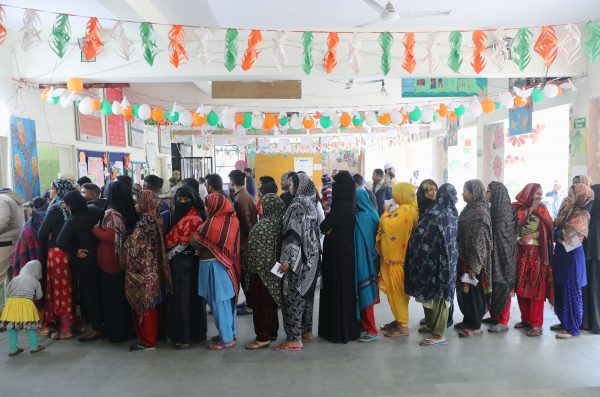The BJP, India’s ruling party, has tried to mobilise Delhi voters on national issues like national integrity and security, using the recent Shaheen Bagh protests in Delhi against the Citizenship Amendment Act passed last year as a reference point in BJP public rallies. But its efforts are likely insufficient to win the Delhi election. The Indian National Congress (INC), which ruled Delhi between 1998–2013, is yet to recover from its poor performance in the 2015 Delhi Assembly elections when its vote share stuck at single digits and it failed to win even one seat.
Two factors put the AAP ahead of its rivals — public approval of the Kejriwal government’sperformance and the huge popularity of its leader. The AAP’s position is made even stronger by the absence of BJP or INC state leaders that come anywhere close to Kejriwal’s popularity.
During its Delhi campaign, the BJP has focussed on the Citizenship Amendment Act issue and the Shaheen Bagh protests. The legislation provides a path to Indian citizenship for migrants who fled persecution from Pakistan, Bangladesh and Afghanistan, but Muslims are not granted the same eligibility. The BJP has used it to create a larger narrative of national integrity, national security and protecting Delhi residents from anti-social elements.
The BJP has tried to shift the focus of Delhi voters to national issues. But based on the Assembly elections in Haryana and Jharkhand last year, it seems that voters will be more concerned about local rather than national issues. If this is true for Delhi voters, it will ensure a big win for the AAP. The Centre for the Study of Developing Societies (CSDS) governance survey of Delhi voters conducted a few months ago, which indicates massive public approval of the work done by the Kejriwal government, confirms this.
The CSDS survey also revealed that 55 per cent of respondents said that they will vote by looking only at the work done by the AAP in Delhi, while only 15 per cent said that they will vote on the basis of the work done by Prime Minister Narendra Modi at the centre. Although the survey was conducted last November, it is unlikely that people’s views on this have changed drastically in the past few months.
The satisfaction with the central government was also found to be on the higher side, but going by the precedents set in Haryana and Jharkhand, it is unlikely to translate into votes for the BJP. Indeed, the data shows that the AAP is the most popular choice even among voters who are completely satisfied with the central government’s performance.
The AAP will also benefit from the absence of an anti-incumbency sentiment. Even though the BJP is very popular at the national level, securing 58 per cent of votes in the 2019 Lok Sabha elections, strong anti-incumbency sentiments against the Khattar-led BJP government in Haryana denied a majority to the BJP in their 2019 Assembly election.
Similarly, in Jharkhand, the BJP’s vote share in the 2019 Assembly election was around 22 per cent lower than the BJP’s vote share in the 2019 Lok Sabha, owing to the unpopularity of the then chief minister of Jharkhand, Raghubar Das, especially among the Adivasi minority population. Anti-incumbency sentiments against their respective state governments also outweighed Modi’s popularity in the State Assembly elections in Rajasthan, Madhya Pradesh and Chhattisgarh. The AAP does not seem to be having any difficulty on this front.
It is important to note that at a time when elections have become more about the popularity of individual leaders than their parties, the AAP scores heavily over the BJP in Delhi. The BJP does not have a leader to match the extremely popular Chief Minister from the AAP, Arvind Kejriwal. The BJP has put forward the face of Prime Minister Modi against Kejriwal. Even in this contest between Kejriwal and Modi, the former looks stronger in his territory.
Sanjay Kumar is Professor at Centre for the Study of Developing Societies (CSDS). The views expressed are personal.

